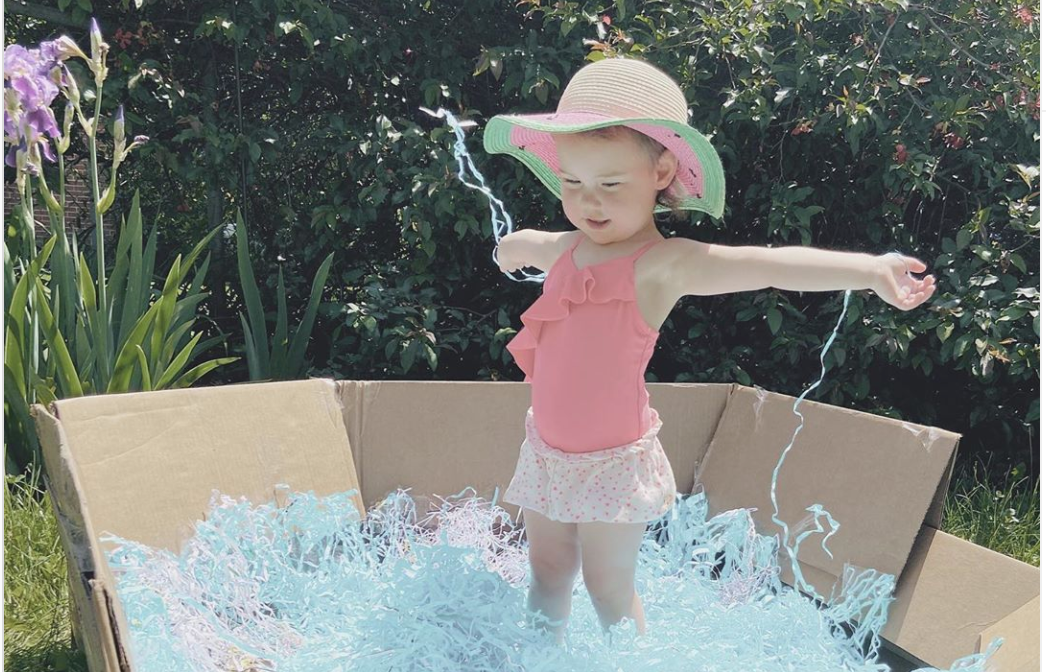Tinkergarten founder Meghan Fitzgerald recently joined the Whole Mamas podcast with Dr. Elana Roumell and Stephanie Greunke, registered dietitian and program manager for Whole Mamas, to help answer some common questions about the changing school climate, what our kids really need to thrive right now and what to expect when school reopens. Here’s their conversation, edited for space.
Whole Mamas: Since you're an expert in child development, what are you seeing with kids and how they're being emotionally and mentally challenged with the school closures and shutdowns and isolation?
Meghan Fitzgerald: We have a lot of dialogue in our community, and it's very clear that people are seeing emotional shifts in their kids. And it's for a really good reason. Kids are not able to see and connect with the people that they love—grandparents, caregivers, neighbors, dear friends and cousins. All sorts of natural very nurturing experiences have suddenly stopped for them.
They also pick up on our anxiety and our worries, and no matter who you are this is a very unusual time for us as adults and for many of us there are stressors with respect to jobs and safety of loved ones, and just the general state of the world.
So kids are very intuitive and they cue off of us. They might be clinging to us in ways they didn't before. They might be acting out, struggling with their siblings and part of that is simply because they’re spending so much time together and using shared resources. Many people see it as regressing a little bit, acting a stage or two younger. That's totally to be expected. It's in large part a byproduct of this situation and not necessarily something that will persist when things calm down a bit on the other side.
Whole Mamas: How much time do they really need to connect?
Meghan Fitzgerald: A couple of things that can really help is a routine. So kids can start to count on when you're available and when you're not. And that's tricky when you're working because a call can come up and it's so hard to predict sometimes what happens.
But if you can build special moments into the day that you know you can deliver on and kids can count on those, those can become the emotional anchors for children. For example, we always just wake up and read in our PJs in the morning and all of us sit on the couch, read a book together.
And then we always hike at the end of the day. A hike can be just a walk around the neighborhood. But it is a moment that we don't miss. It's putting some love in the bank at the beginning of the day and repairing at the end of the day that's made a tremendous difference.
Whole Mamas: Could you give us maybe a rainy day Tinkergarten activity and then a nice outdoor Tinkergarten activity that we could implement for a toddler and a 5-year-old?
Meghan Fitzgerald: I'm actually going to give you the same activity because all of our Tinkergarten At Home activities can be done outdoors and indoors right now.
This week's Tinkergarten At Home is all about building empathy through faces. So our main activity is using a connecting material like mud if you're outside or a play dough if you're inside, and then lots of found objects. Outdoors, that could be acorns, leaves, tree fruits, pebbles, sticks, to create a face.
Ask, how are you feeling today? And then invite kids to make a face and our faces. You can read emotions on people's faces. It's an opening for kids to think about emotions, to name them. Later when a kid is really frustrated or angry or sad, you can say, "I can see by your face, you're feeling sad." And that's teaching a child how to be aware of the emotion.
Whole Mamas: How long should we expect our children's attention span to be?
Meghan Fitzgerald: It's definitely an intersection of your child's approach and their age. The older children get, the longer they can carry a narrative and stick to a task. But there are some patterns in play that children start to show around a year and a half, possibly earlier, and they are repetitive actions. We call them behavioral schema. We've designed several weeks of Tinkergarten At Home with this in mind and we're always mindful of these patterns when we design any play session because they really are so engaging for children.
An example of one might be that I either spin around or I like to stir or watch fans go around or I might want to watch a wheel go around and around, and certain kids are just fascinated by this. Another might be that I really like to put objects into containers, carry them around, dump them out or drag a wagon around with anything in it or fill up little bags. My children have bags of stuff everywhere like little random things, more like to collect acorns or collect objects outside and I love to fill up a bucket.
That's called transporting. If you notice your child likes to do the same thing over and over again, that’s a sign that their brain is activating one of these patterns. Lean into it. Give them lots of opportunities to do that same thing and don't worry about that repetition because that's something that's clearly engaging them.
Whole Mamas: We're coming up on June now at the time of this recording and parents are probably wondering, what should we be doing to make the most out of this summer?
Meghan Fitzgerald: We have the same conversation here. We don't have to see the learning and play as different. Play really is a phenomenal way to learn.
For many children, the switch to summer can actually be quite anxiety-inducing because it's such a switch of schedule. Although we want summer to feel special and we all need to have a bit of a break, I think there's a lot of benefit in getting your family on a schedule for playful home learning as soon as you can and then carrying that through summer.
Think about where you're going to build in your reading, in your math, but then make sure that you do have big chunks of time for play. And that's why for Tinkergarten, we're designing Tinkergarten At Home activities right through the summer.
Whole Mamas: A lot of us are thinking about that right now even going into summer, what is this going to mean come September? So what are some things that we can think about through the summer as we're approaching potentially going back to school to prepare our kids emotionally and mentally?
Meghan Fitzgerald: There's a lot of preparation we can do with kids even starting now. We just published a few blog posts. One, just how to think about helping prepare kids for reopening of life, how to work up toward socially distant play dates, what could that look like? How would you support kids with that?
And then for places where mask-wearing is an important thing, how do we start to normalize that and make that familiar and comfortable for our kids?
Whole Mamas: How do we approach play dates?
Meghan Fitzgerald: There are some things that you can do to set kids up for understanding and there might be certain ages where asking them to stay apart from friends is just too hard. So that may be where you learn to help kids to see friends, wave at friends, visit friends, bike by friends, drive by friends. But you can do a number of things that are really helpful and you nailed one of them which is be outside.
There's a great New York Times article last week about how just the likelihood of transmitting in an outdoor setting is so much lower and so much safer. So meet outside, for short periods of time until kids can get used to what it means to be socially distant. You can also practice it at home. My husband is about 5'11", so we had him lay down, and we put a piece of tape at his head and a piece of tape at his feet.
What would it look like to actually play with a friend at that distance? Kids need to feel that and understand it.
If little ones are having a hard time, just reminding them of you're going to stay next to mama while we're at the play date. It's not the play date of any of our dreams, but it's a way to kind of step your way back into being physically near people but learning to keep a distance.
Whole Mamas: Is there anything else that you wanted to leave our listeners with or share before we wrap up?
Meghan Fitzgerald: I just send love to everybody because we are all working awfully hard right now, and welcome you in whatever way works for you and your family to put a little more play and bring the outdoors in.
And even if that's just moving a table by the window or bringing some nature objects inside, wherever you are and whatever you have access to, those two things, I think really are lifelines to kids and back to us.
Photo credit: @birdieandbug

